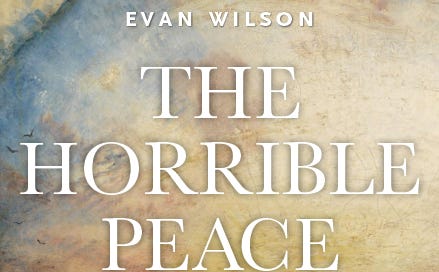It’s been quiet around here, but that’s for a good reason—I’ve been writing. I’ll have more to say about what I’ve been writing and why I’ve been writing it in due course.
In the meantime, here are some recommendations for things to read and watch, sorted into three categories: “not me,” “by me,” and “about me.” (Hey, it’s my newsletter.)
Not Me
Why don’t Inuit get scurvy?
This question has surprising relevance for naval history. Scurvy (a vitamin C deficiency) was one of the great killers of the pre-industrial era. For sailors on long voyages without access to fresh fruits and vegetables, it was a particular risk. The Royal Navy took a long time to solve the problem—not until the 1790s could it be said to be under control—and even then, it lingered in some surprising places.
A sailor on a months-long voyage and a person living north of the Arctic circle share some similarities when it comes to accessing vitamin C. For a long time, researchers thought that it was various parts of fresh seal meat (including seal eyeballs—sorry for that image) that added enough vitamin C to Inuit diets to prevent scurvy. This article shows that in fact most Inuit got most of their vitamin C from algae. The more you know…
The As-You-Know-Bob Problem
My academic training has hampered my ability to communicate to a broad audience. I’m always on the lookout for tips and tricks for turning academic writing into not-academic writing. I bookmarked this piece from almost a year ago for that reason.
It takes a long walk to get there, but for anyone interested in how to communicate complicated information, I think it’s worth reading to the end. The basic idea is that science fiction has grappled with this issue for a long time, and the best science fiction writers have come up with creative ways to handle it.
By Me
Oliver Hazard Perry
In September, I wrote a little about my lecture on Oliver Hazard Perry for the South Kingstown, RI, 300th Anniversary Speaker Series. The video has since been posted, though viewer discretion is advised. As I mentioned at the time, I caught a stomach bug from my kids that morning, and the auditorium was without air conditioning. I was hanging onto the podium for dear life, and I had to shout to be heard over a giant floor fan.
But if you want to hear past the introduction (which I posted in the link above), here you go:
Society for Army Historical Research
I gave an online book talk on The Horrible Peace to the British Society for Army Historical Research.
Really glad that’s how the video froze my face.
Sugar and Navies in the Age of Sail
That post was about my introduction to the forum on the British Navy in the West Indies in the age of sail. The forum has now been published. It’s paywalled but if you’d like a copy of my article or any of the other articles in the forum, send me an email.
Oxford Bibliographies
I recently wrote an annotated bibliography that the publisher called “War at Sea in the Age of Napoleon.” My first line points out that Napoleon was famously not much of a sailor. Regardless, it was an interesting exercise, and I suspect it will form the basis for some future posts here. Here’s a link, paywalled as usual.
About Me
There have already been a few nice reviews of The Horrible Peace. I was flattered that Luke Reynolds and Roger Knight both recommended the book:
Here is Luke’s write-up of his annual book list for the Society for Army Historical Research.
And here’s Roger Knight’s “Best History Books to Change Your Ideas about the Napoleonic Wars.”
Finally, I was very pleased to read Lincoln Paine’s kind review of the book on his Substack:






